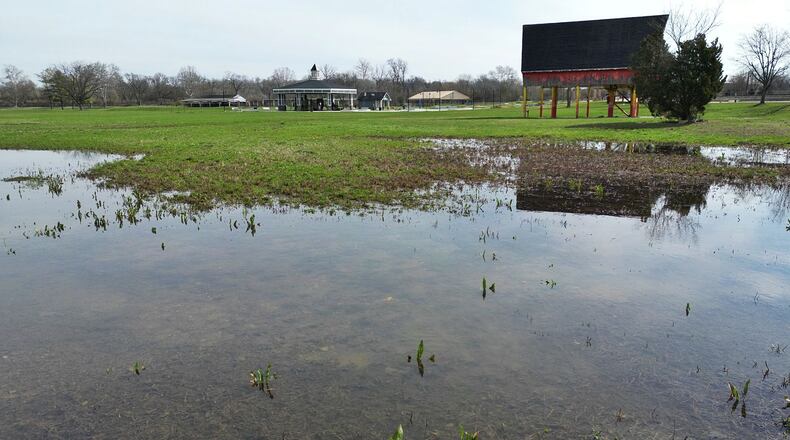Pease presented two plans with much different price tags to reduce the standing water that occurs after a heavy rain at Bicentennial Commons. The park, located on the property that once housed LeSourdsville Lake and Americana Park, is prone to standing water due to the amount of concrete buried and left behind after the parks closed.
During large rainfall events, stormwater collects around the tree wells near the carousel playground and several other areas in the south half of the park, according to the presentation.
A soils investigation found that while some concrete foundations remained below the surface, the “larger issue” was the layers of clay soils, Pease said.
One option is to convey stormwater from the tree wells, playground and other features to the pond through a pump station. Any overflow from the pond would be moved to the Great Miami River, he said.
He said additional improvements may be built in phases.
The cost of the first option that includes one pump station is $3.6 million, he said.
The second option includes separate storm sewer systems to drain the north and south halves of the park with two pump stations. That option is $5.5 million with $1.3 million of that connected to the second pump station, he said.
A seven-acre pond would be about five feet deep and up to seven feet after heavy rainfalls. A three-foot thick clay liner would retain the water, he said.
Pease offered three alternatives for Community Park.
The first plan called for using existing drainage patterns, improving ditches to convey stormwater, and providing designated locations for stormwater to collect. Price tag: $500,000.
The second option called for constructing storm sewers to covey stormwater and building a stormwater detention basin in the southwest portion of the park. Price tag: $2.8 million.
The third, and most expensive option, called for storm sewers and underground detention west of the ball diamonds. Price tag: $4.9 million.
Kacey Waggaman, acting city manager, said the drainage issues must be addressed before the city moves forward on any other park improvements. She said those issues were discovered after the city completed Phase I.
IN OTHER NEWS: Council unanimously approved emergency legislation that extends a moratorium for 180 days on the granting of any new permits allowing retail dispensaries for medical marijuana within the city.
Council wants to see the results on Issue 2 in the Nov. 7 election, a proposal to legalize recreational marijuana in Ohio and regulate it like alcohol, before it decides the next step.
K. Philip Callahan, the city’s law director, said council could vote on the moratorium before the 180 days expire.
After much discussion, a resolution that would have authorized Waggaman to enter into a $15,400 engineering agreement with ChoiceOne Engineering for a traffic calming study on Crossing Boulevard was tabled.
Council member Michael Graves said he didn’t understand why the city would pay for a study when it knows that speeding is the issue.
The city has conducted a speed study with its radar unit that showed the average speed on Crossings Boulevard was 38 miles per hour, three mph over the posted speed limit, said Public Works Director Gary Morton.
The city also has painted the roads in hopes of slowing motorists. Placing additional police officers on the road isn’t an option due to staffing concerns, officials have said.
Speeding concerns were brought to council by local residents.
“The residents want results,” Mayor Keith Funk said.
Graves suggested more stop signs, but Morton said some motorists would “roll through” the signs and increase their speed between the signs.
About the Author

